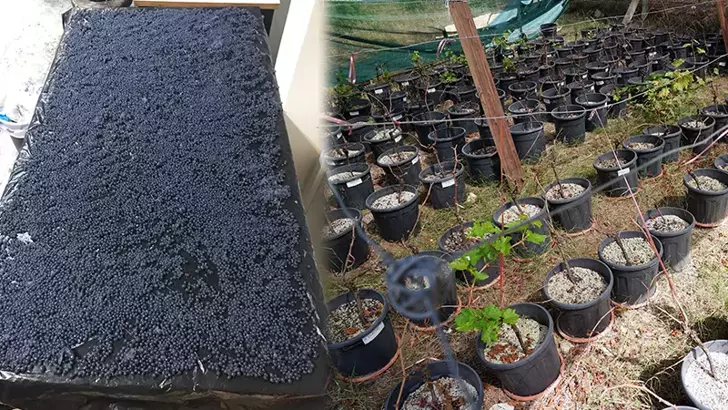At Mersin University (MEU), hydrogel was produced to protect and increase the resilience of Mediterranean vineyards affected by drought.
A TUBITAK-supported international project titled ‘Ecological Research for Biological Management and Protection of Mediterranean Vineyards Facing Climate Change’ was prepared under the direction of Prof. Dr. Yağmur Uysal, a faculty member at MEU Faculty of Engineering, Department of Environmental Engineering, and Assoc. Prof. Dr. Zeynep Görkem Doğaroğlu as a researcher. The project, which is also accepted within the scope of the PRIMA (Partnership for Research and Innovation in the Mediterranean Area) program, which supports international joint projects of Mediterranean countries, is called VINEPROTECT and is being carried out at universities in Portugal, Italy, Morocco and Turkey. The team working on the Turkish leg of the project produced hydrogel to take measures for vineyards in Mediterranean countries that are affected by drought.

Giving information about the project, Prof. Dr. Yağmur Uysal stated that water resources are decreasing due to climate change and that they are making applications to increase the resistance of vineyards to combat drought. Prof. Dr. Uysal said, “We produce hydrogels in our laboratory. When these hydrogels are applied to the soil, they increase the water retention capacity of the soil. Because it has a bead structure. It has an inflatable feature. It swells when it receives water and slowly releases its water over time. When it receives water again, it swells again, but since it can perform this process continuously, you do not have to irrigate agricultural products frequently. Therefore, reducing the frequency of irrigation means reducing the need for irrigation water. Because our farmers are already having great difficulty in irrigation. We can apply this not only to grapevines but to all agricultural products. Within the scope of the project, we conducted experiments on pots in the area created within the university and at the end of the study, we saw that the need for irrigation decreased. We pruned the branches of the vines in the pots during the winter and charcoalized them with the biochar technique. We add the charcoal we produce into these hydrogels. What we produce is a polymeric material called hydrogels. Since we carbonize the pruning wastes and put them inside, these are actually beads containing charcoal. This has the following contribution; you turn your agricultural and pruning wastes into a valuable product. You turn it into coal. Coal is naturally extracted from the earth’s crust, but we synthesize it into a material we call biochar with the same properties in our laboratory in a short period of time and give it into hydrogels. What is the reason for this? To reduce agricultural waste with a zero waste approach and to increase the carbon content in our soil.”

‘NATURAL AND WITHOUT ANY TOXIC EFFECTS’
Prof. Dr. Uysal said that they got good results from the trials, “We conducted trials under normal irrigation conditions, a little less frequent irrigation, which we call moderate drought, and a little longer irrigation frequency, which we call very dry. No drying was observed even in the vines that we did not water for a long time. This demonstrated our hydrogels in a good way. The hydrogels we produce are natural and do not have any toxic effects. To increase the widespread impact of the study, it needs to be applied in real vineyards. The hydrogels we have prepared will be tested in vineyards in Morocco, Portugal and Turkey.”
Assoc. Prof. Dr. Zeynep Görkem Doğaroğlu, who is a researcher in the project, said, “We aim to reach producers by increasing the widespread effect of the hydrogels we produce. It is both economical and environmentally friendly. Therefore, it is a very advantageous system.”

















